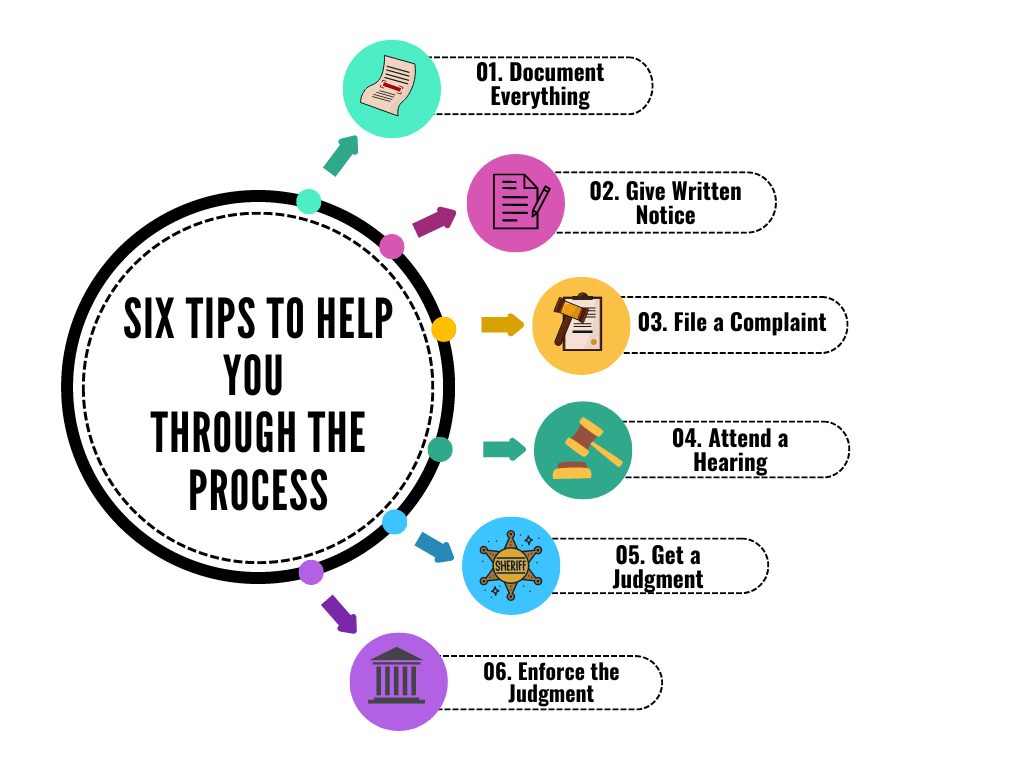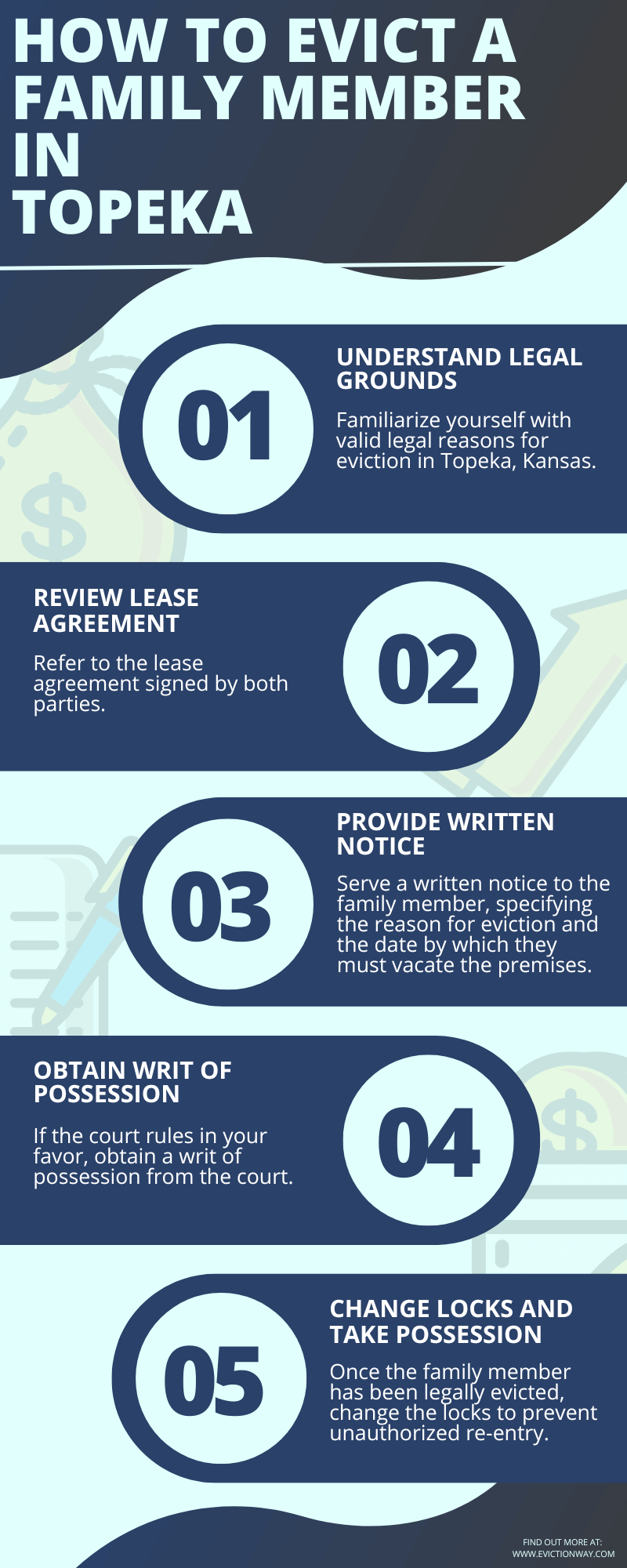If you’re in Topeka and need to evict a family member, you’re not alone. It can be a tough decision, but it’s important to know your options. In this blog post, we’ll share the best way to evict a family member in Topeka. We’ll tell you the method to evict them, and we’ll share tips on removing a family member politely. We’ll also cover the laws involved and provide some legal tips.
Evicting a family member can be a difficult process, but it’s important to remember that you have rights. If you’re being harassed or threatened by a family member, you may need to take legal action. In some cases, you may be able to get a restraining order. If you’re not sure what to do, it’s always best to talk to a lawyer.
We understand that evicting a family member can be a difficult decision. That’s why we’re here to help. We’ll provide you with all the information you need to make the best decision for your family.

How To Evict a Family Member In Topeka
Evicting a family member is never easy, but it may be necessary to protect your rights and property. If you’re considering evicting a family member in Topeka, here are six tips to help you through the process:
1. Document Everything
Keep a record of all interactions with your family member, including any conversations, text messages, or emails. This will help you establish a timeline of events and provide evidence if necessary.
2. Give Proper Notice
In Topeka, you must give your family member at least 30 days’ written notice to vacate the property. The notice must include the date by which they must leave, the reason for the eviction, and a statement of their rights.
3. File a Complaint
If your family member does not vacate the property after receiving the notice, you will need to file a complaint with the Shawnee County District Court. The complaint should include a copy of the notice you gave to your family member and a statement of the facts of the case.

4. Attend the Hearing
Once you have filed a complaint, the court will schedule a hearing. At the hearing, you will have the opportunity to present your case and your family member will have the opportunity to present their defense.
5. Get a Judgment
If the court finds in your favor, it will issue a judgment of eviction. The judgment will order your family member to vacate the property within a certain period of time.
6. Enforce the Judgment
If your family member does not vacate the property after the judgment is issued, you may need to take further action to enforce the judgment. This may involve hiring a sheriff to remove your family member from the property.

Additional Resources for Topeka eviction help:
30 day eviction notice Topeka
In Topeka, a 30-day notice to quit for non-payment of rent is a document used by landlords to inform tenants they’ve missed rent. It gives the tenant 30 days from the date they receive the notice to do one of two things:
- Pay the rent in full
- Vacate the property
If the tenant doesn’t comply within the 30 days, the landlord can then proceed with filing an eviction lawsuit in court.
You can download 30 day eviction notice Topeka here.
How Much Does it Cost to Evict a Family Member in Topeka?
Evicting a family member can be a difficult and expensive process. The cost of eviction will vary depending on the specific circumstances of the case, but there are some general costs that you can expect to incur.
| Cost Item | Estimated Cost Range | Notes |
|---|---|---|
| Filing Fee | $100 – $200 | Varies depending on the type of eviction and court jurisdiction. |
| Service of Process | $50 – $100 | Cost to serve legal documents to the family member. |
| Attorney Fee | $500 – $3,000 | Varies based on attorney’s rates and complexity of the case. |
| Court Costs | Varies | May include appearance fees, motion fees, etc. |
- Filing fees: The first step in the eviction process is to file a complaint with the court. The filing fee for an eviction complaint in Topeka is $100.
- Service of process: Once the complaint has been filed, it must be served on the tenant. The cost of service of process will vary depending on the method of service.
- Attorney fees: If you hire an attorney to represent you in the eviction process, you will be responsible for their fees. Attorney fees can vary widely, so it is important to get a quote from an attorney before hiring them.
- Court costs: In addition to the filing fee, you may also be responsible for other court costs, such as the cost of a hearing or a trial.
FAQs: Evicting a Family Member in Topeka
Here are some of the most frequently asked questions about evicting a family member in Topeka:
What are the legal grounds for evicting a family member in Topeka?
In Topeka, you can evict a family member if they have violated the terms of their tenancy, such as not paying rent or damaging the property. You can also evict a family member if they are engaging in illegal activities or if they are a threat to your safety.
What is the process for evicting a family member in Topeka?
The process for evicting a family member in Topeka is similar to the process for evicting any other tenant. You must first give the family member a written notice to vacate the property. If the family member does not vacate the property within the time specified in the notice, you can file an eviction lawsuit with the court.
How long does it take to evict someone in Kansas?
The landlord has 14 days to respond to the tenant’s counterclaim and the writ of restitution can be served within the same 14-day period. The tenant’s belongings will be stored for 30 days. Overall, the process from counterclaim to final resolution could take anywhere from 3 weeks to 3 months.
How do I delay an eviction in Kansas?
You can delay an eviction by responding to the eviction lawsuit and asserting any legal defenses you have.
Is a 3 day eviction notice legal in Kansas?
Yes, Before beginning legal eviction proceedings, your landlord must provide you 3 days’ notice to leave the residence.
How long does an eviction stay on your record in Kansas?
Eviction records generally remain on your public record for a period of up to seven years.
What is the emergency help for families getting evicted in Kansas?
Kansas Emergency Rental Assistance (KERA) provides financial assistance to prevent evictions. Contact local social service agencies for additional support.
What are some tips for evicting a family member in Topeka?
Here are some tips for evicting a family member in Topeka:
- Document everything: Keep a record of all communications with the family member, including any notices to vacate and any incidents of illegal activity or threats to your safety.
- Be prepared to go to court: If the family member does not vacate the property voluntarily, you will need to file an eviction lawsuit with the court.
- Seek professional help: If you are having difficulty evicting a family member, you may want to seek professional help from an attorney or a social worker.
What are some resources for people who are being evicted in Topeka?
There are a number of resources available to people who are being evicted in Topeka. These resources include:
- The Topeka Housing Authority: The Topeka Housing Authority provides rental assistance to low-income families and individuals.
- The Kansas Legal Services: The Kansas Legal Services provides free legal assistance to low-income families and individuals.
- The Topeka Rescue Mission: The Topeka Rescue Mission provides shelter and other services to homeless people.
What are some tips for preventing eviction?
Here are some tips for preventing eviction:
- Pay your rent on time.
- Follow the terms of your lease.
- Keep the property in good condition.
- Avoid engaging in illegal activities.
- Be respectful of your landlord and neighbors.
Related:
How to Evict a Family Member in Torrance
